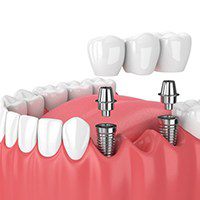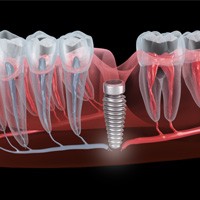

If you’re ready to finally replace your missing teeth or upgrade your denture, why not use the solution touted by dentists around the world as the gold standard of tooth replacement? Tooth replacement with dental implants in Covington, GA look and function better than traditional bridges and dentures, and they’ve been shown to last multiple times longer as well. For patients serious about putting their tooth loss behind them, Dr. Dean is able to provide start-to-finish dental implant care right here in Covington.
Dental implants are tooth replacements made up of three specific parts. This includes the implant post that replaces the root, the restoration that goes on top, and an abutment that connects them together. Unlike other options for replacing teeth, dental implants ensure patients can achieve a truly long-lasting solution for their tooth loss. Not only do dental implants last for decades at a time, but they feel natural when speaking and even when chewing the toughest foods imaginable. The confidence that people maintain while living with dental implants is one of the most common reasons why dentists recommend them first over other traditional treatment options.

Over the course of Dr. Dean’s 25+ year career, he has taken countless hours of continuing education. Thanks to this, he’s one of the few dentists in the area that can perform the entire implant procedure himself from start to finish, including the surgical placement of the new roots. Because his patients don’t have to deal with referrals, they’re able to save time and money while rebuilding their smiles, and they enjoy the peace of mind of working with the same dentist throughout the entire process. You can learn more about the procedure step-by-step below!

If you are interested in replacing teeth with dental implants, Dr. Dean will need to complete a detailed consultation ahead of time in order to determine your eligibility to receive treatment. Not only can he confirm the number of teeth you’ll need to have replaced, but he will measure the bone volume inside your jaw to confirm if implants can effectively integrate with them over time. He’ll also be happy to answer any questions you may have about the procedure and aftercare steps to keep your implant healthy. If he determines you are able to complete treatment, you’ll be scheduled for surgery at a later date.

Ahead of your procedure, Dr. Dean will provide a local anesthetic that removes all sensation in the treatment area. As a result, the most you’ll feel is pressure during the placement of the implant itself (and tooth removal if applicable), not discomfort. First, he creates a small incision in the gum tissue so that a tiny hole can be created in the jawbone. An implant is then placed and the gums are stitched closed. He’ll repeat this process if multiple implants need to be attached. Following the end of your procedure, he’ll go over aftercare tips to keep your implant healthy as well as schedule you for a follow-up appointment to confirm it is healing as intended.

Dental implants must integrate with bone tissue so they can remain stable for decades at a time. This process is known as osseointegration and is precisely why dental implants have the longevity they do. Once the titanium post is fully integrated (a process that takes about four to six months), an abutment can be attached. During this treatment, we reopen the gum tissue and place the abutment directly on top of the implant, then close it so the gums can heal. This healing phase takes an additional couple of weeks.

At your final appointment for your dental implant, we’ll be able to attach your permanent restoration to your replacement root. The crown, bridge, or denture you receive will connect to the abutment, which provides added stability and ensures the restoration does not loosen or fall out of place. Every restoration we provide is made from natural-looking porcelain and highly personalized so it blends in exactly with your neighboring teeth and keeps your bite even.
Why does Dr. Dean recommend dental implants to so many of his patients? Because they offer the only treatment that restores an entire tooth. A small titanium post is placed into the jawbone to recreate the tooth root, and this is used to secure a new crown, bridge, or denture. This approach offers a number of unique advantages that you won’t find with other common tooth replacements, including the following:




If you lack teeth, you’ll likely qualify for dental implants. A good candidate for them only needs to suffer from tooth loss or damaged pearly whites. That said, you’d still be wise to consult Dr. Dean before pursuing care. He and his team will assess your smile and confirm if implants are right for you. As for how that’d work, we’re happy to tell you. Just keep reading or call our office for the relevant details.

Really, almost any healthy adult can qualify for dental implants. Ideal implant candidates only need to meet three criteria, including:
Even if you’re not a good implant candidate, you can become one later. Simply get preliminary dental work, whether tooth extractions, gum disease therapy, or bone grafting. These services will make your mouth strong enough to support implants.

If you’re missing only one tooth, the solution is simple: Just get a single implant post and dental crown. With these items, your substitute tooth root will have a porcelain surface and blend with your smile. The result would be a new, free-standing tooth that looks pretty and keeps other teeth from tilting.
Better yet, this option has more upsides than the alternatives. A single implant will last longer than a dental bridge and won’t remove pre-existing enamel.

An implant bridge would be suitable when you lack multiple teeth in a row. This prosthetic relies on two implants fused to a pontic – a synthetic tooth held in place by abutments. Once placed, it would fill the gap left by tooth loss and restore your full smile.
To be clear, an implant bridge is more cost-effective than direct tooth replacement. (The former service is traditional, while the latter is a pricey emergency option.) It’s also much more natural-looking and stable.

Should you lose all your teeth (or all those along a row), you ought to try implant dentures. These kinds use a minimal number of implants to ensure maximum stability and functionality.
Per their name, implant dentures secure directly to the jaw with implants. That feature makes them more permanent and unmoving than other replacements. Consequently, these dentures are well-liked by patients who want prosthetics that don’t slip.
Learn More About Implant Dentures

Dental implants have quickly become the gold standard for tooth replacement, according to Dr. Dean and dentists around the country alike. Their longevity, esthetics, and restorative properties make them the most unique and effective treatment for replacing the crown and root of teeth. Once the implant post is placed inside of the jaw and given time to heal, a custom-made crown can easily be crafted to fit over the top of the post, making your smile complete. However, if you’re unsure what can influence the cost of this treatment, the team at Dean Dental Care is ready to help! Call his office today to set up your next consultation!

Dental implants are a highly customized treatment, which means that your tooth replacement needs will widely vary from any other patient’s. For example, if you needed to replace a single tooth vs. all the teeth in your mouth, it can be done, but it will cost much more to complete treatment. Furthermore, the state of your oral health as well as the condition of your jaw can greatly influence what your total price tag will be. If you need gum therapy to treat infected gum tissue or a bone graft/sinus lift to increase the available amount of bone tissue for implant placement, this will affect your costs as well.

Dental implants are made up of three distinct parts. This includes the titanium post that integrates with your bone tissue, the restoration that fits over the top portion of the implant, and the abutment that connects the two components together. Each of these parts come with their own costs, especially the restoration since it can change wildly depending on how many teeth you need to replace. For example, replacing a single tooth with one implant-retained crown is much cheaper than using a dental bridge or denture that’s designed to affix to several dental implants at once.

In order to best determine a more precise cost of your treatment, it’s crucial that you set up an initial consultation with Dr. Dean. Whether you want to learn more about the process or see if you are eligible for treatment, a consultation lets you determine what your specific needs might be. The better you understand the number of teeth you want to replace and which treatments you’ll need to get it done, the more accurate your treatment estimate becomes. When you want a tooth replacement that not only looks great, but stands the test of time and prevents existing bone tissue from breaking down, there’s no other treatment quite like dental implants.

You deserve dental implants that last a lifetime. Making that a reality, however, will require effort on your part. Implants need to be cared for in much the same way as natural teeth. That means keeping them as clean as possible and adopting habits that will help protect them. Don’t worry – implant maintenance is very simple, which is part of the reason why the procedure has a success rate of 90% to 95% even after 10 years.

If you’re already in the habit of brushing twice a day and flossing daily, then you can simply continue to do so. Pay close attention to the gumline where the gum tissue and the implant restoration meet. Your goal should be to remove as many harmful bacteria as possible before they can cause a gum infection that could easily lead to dental implant failure. You should consider using mouthwash as well, as it can help get rid of the bacteria that you were unable to remove with your toothbrush.

After osseointegration is complete, you’ll be free to eat whatever you want with your dental implants. Focus on eating a lot of foods that will promote successful dental implants while staying away from foods that will actively harm your oral health. Calcium and vitamin C help maintain the jawbone and the gums, but sugar and starch will encourage gum disease. Review your personal eating habits and make adjustments where you can in order to keep your implants safe.

Biting your nails, chewing on the end of a pen, opening packages with your teeth, and crunching ice might seem like relatively harmless habits, but eventually they can cause dental implants and the restorations they support to break and fail. The sooner you break these habits, the safer your implants will be. If you smoke, it’s in your best interest to quit before the implants are placed, so start researching programs and resources that might help.

Playing sports can put your implants and the rest of your teeth at risk, which is why you should be wearing a mouthguard even if it’s not a required piece of equipment. This simple oral appliance will separate your implant from the point of impact so that it isn’t damaged if you’re hit in the head. We also recommend getting a mouthguard if you’re in the habit of grinding your teeth at night when stressed. Doing so could prevent excessive amounts of wear and tear to the implant and the restoration it supports.

Sometimes problems can arise with your implants but you don’t notice them until later. Dr. Dean can examine your implants during your six-month checkups in order to make sure that they’re still intact and functional. He can also look for warning signs of gum disease so that it can be treated long before it causes any of the bone loss that can easily result in implant failure.

Dental implants are a preferred tooth replacement option because of their numerous benefits, but they are quite an investment, so it pays to be well-informed. Here are the answers to some of the most common queries we receive about dental implants in Covington. If you don’t see the information that you’re looking for below, don’t worry! Give us a call and we’d be happy to address your questions and get you started with an initial consultation.
The lifespan of dental implants depends on the lifestyle choices and health of the patient. To ensure that dental implants last, be sure to brush, floss, and rinse with mouthwash on a daily basis. It’s also important to attend regular dental cleanings and checkups. Avoid chewing on anything that is particularly hard or sticky. With proper maintenance, dental implants can last upwards of 30 years! That’s several times longer than the average traditional bridges and dentures.
For patients with good overall health, dental implants are very successful when placed by a skilled professional. If you have low jawbone density, gum disease, or another oral health issue, it will need to be dealt with ahead of time for a safer, more successful dental implant surgery. Certain health issues, like diabetes and cancer, can make the surgery and healing risky, so they will be addressed during your initial consultation.
Most dental professionals will not place dental implants in patients who are younger than 18. This is because when dental implants are placed before the jaw is finished growing, it can interfere with further bone development and potentially result in complications. Most people’s jaws aren’t fully developed until adulthood, and some people’s take until their mid-20s.
It is possible to get dental implants if you smoke, but there is a higher rate of implant failure for smokers. This is become smoking causes dry mouth, slows down healing, and can interfere with the implants’ ability to fuse with the jawbone. Smoking can also cause dry socket. When getting dental implants, it is important to give up smoking for at least two weeks before and three months after for the greatest chance of success. Of course, this is also a great time for you to give up the habit for good.

After your dental implants are surgically placed in your jawbone, you will have to go through a recovery period. Do not worry. The process is pretty easy for most people. Below, you will find information about what to expect during your recovery and how you can minimize your discomfort. Of course, if you have questions or concerns at any point after your procedure, you should give us a call.

In the days following your surgery, blood clots should form at your dental implant sites. Because the clots play a vital role in your body’s healing process, you should protect them by taking a few simple precautions:

After your surgery, you may experience:
If you experience any severe or prolonged side effects, call our practice so we can provide help.

At first, you should adhere to a no-chew diet. It can include things like:
As your mouth heals, you can start to incorporate tougher foods. Be sure to listen to your body and not take on anything that your mouth is not ready for. Hard, crunchy, and tough foods can cause some significant irritation, so it is best to avoid them if possible.

Starting the day after your surgery, you can brush your remaining natural teeth according to your normal routine, though you should be careful not to irritate your surgical sites. Rinsing with warm salt water can help to calm inflammation. If you choose to use mouthwash, opt for a product that does not contain alcohol.

Once your new teeth are attached, you might experience some gum irritation and mild soreness. Over-the-counter pain medication, combined with a soft diet, can help. There will be no lengthy recovery and no required downtime. You will be able to start using your beautiful new smile right away!

Sometimes infections, physical trauma, and other issues can cause dental implants to fail. As such, it’s important to have a reliable dentist you can turn to in the worst-case scenario! Call us immediately if you have concerns about your dental implants; we’ll make arrangements to see you as soon as we can so that we can determine what the problem is and figure out what steps need to be taken to try and salvage your restored grin.